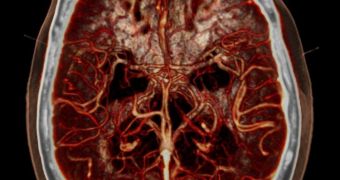A team of investigators from the University of Bristol, in the United Kingdom, and the Florey Neuroscience Institute in Melbourne, Australia, announces the discovery of a section of the nervous system that is responsible for underlying the link between the heart and the brain.
Any sort of glitches affecting this particular region can have devastating consequences. Scientists believe that understanding it in more detail could conceivably lead to the development of new therapies for cardiovascular diseases, heart conditions and a number of other illnesses.
In order to observe how the brain regulates the heart, investigators used a number of advanced research techniques, which allowed them to make sense of this connection. Whenever this area of the brain works poorly, people are at an increased risk of dying from heart failure.
Details of the investigation appear in the latest advanced online issue of the esteemed medical Journal of Physiology. UB experts Dr. Tony Pickering and professor Julian Paton led the research with their FNI colleague, professor Robin McAllen.
Their innovative collaboration allowed the researchers to create a new way of analyzing and monitoring nerve cells as they control the beating of the heart, as well as aspects related to this process.
Both the parasympathetic (vagal) and sympathetic divisions of the nervous system contribute to controlling the way the heart beats. Vagal nerves carry cardiovascular reflex, including the one that calls on the heart to slow down its rate when we are under stress.
Heart failure, hypertension and other cardiovascular diseases occur most often when the vagal nerves lose their ability to provide this protective effect to the heart. The nerves can be found on and within the very muscles in the heart.
However, studying them in this configuration has thus far proven to be extremely challenging, scientists say. Scientists at the UB Heart Institute and Bristol Neuroscience were recently able to exceed this limitation, and observe these nerves as the heart was still beating.
“As loss of vagal tone is found in a number of cardiovascular diseases such as heart failure, following heart attack, in high blood pressure and diabetes, and is associated with poor prognosis and an increased risk of death, our results indicate that therapies targeted at the cardiac ganglion could restore vagal tone and potentially improve outcomes,” Dr. Pickering explains.
The investigator holds an appointment as a Wellcome Senior Clinical Research Fellow at UB, and a Reader in Neuroscience and Consultant in Anesthesia at the university’s School of Physiology and Pharmacology.
According to British Heart Foundation research advisor Helene Wilson, “the vagus nerves are absolutely vital for the control of the speed and regularity of our heart's beat.” This makes them prime targets for future therapies aimed at addressing heart-related disorders.

 14 DAY TRIAL //
14 DAY TRIAL //